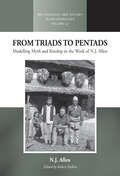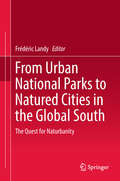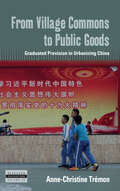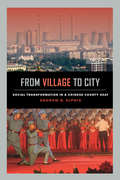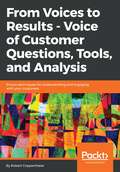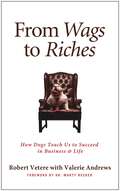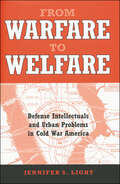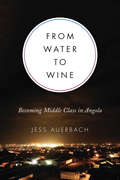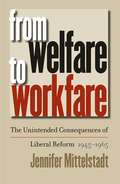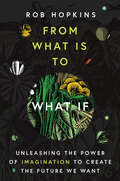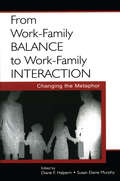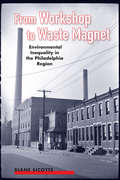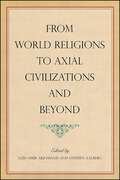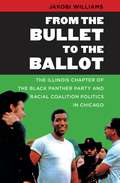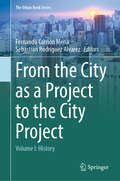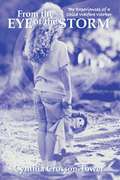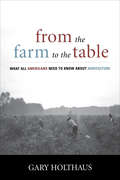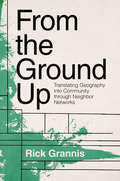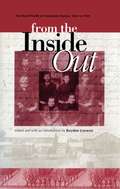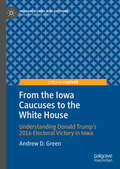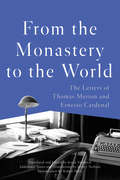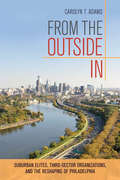- Table View
- List View
From Triads to Pentads: Modelling Myth and Kinship in the Work of N.J. Allen (Methodology & History in Anthropology)
by N. J. Allen Robert ParkinN.J. (‘Nick’) Allen had an extensive academic career, which for the most part was spent in Oxford. He passed away in 2020. This edited volume brings together a selection of his anthropological papers. They cover two major fields and a supplementary one: Indo-European mythical comparison and his own notion of tetradic kinship, supplemented by a long-term interest in the work of Marcel Mauss and his uncle Émile Durkheim.It follows key areas of his research in which his contributions were novel, innovative, stimulating and plausible.
From Urban National Parks to Natured Cities in the Global South: The Quest for Naturbanity
by Frédéric LandyThis important volume focuses on the sensitive issue of interrelationships between national parks situated near or within urban areas and their urban environment. It engages with both urban and conservation issues and and compares four national parks located in four large cities in the global South: Rio de Janeiro, Cape Town, Mumbai, and Nairobi. Though primarily undertaken as academic research, the project has intensively collaborated with the institutions in charge of these parks. The comparative structure of this volume is also original and unique: each of the chapters incorporates insight from all four sites as far as possible.The term “naturbanity” expresses the necessity for cities endowed with a national park to integrate it into their functioning. Conversely, such parks must take into account their location in an urban environment, both as a source of heavy pressures on nature and as a nexus of incentives to support their conservation. The principle of non-exclusivity, that is, neither the city nor the park has a right nor even the possibility to negate the other’s presence, summarizes the main argument of this book. Naturbanity thus blurs the old “modern” dichotomy of nature/culture: animals and human beings can often jump the physical and ideological walls separating many parks from the adjacent city. The 13 chapters and substantive introduction of this volume discuss various aspects of naturbanity: the histories of park creation; interaction between people and parks; urban governance and parks; urban conservation models; wildlife management; environmental education; and so on. This is a must-read for students and researchers interested in social ecology, social geography, conservation, urban planning and ecological policy.
From Village Commons to Public Goods: Graduated Provision in Urbanizing China (Dislocations #34)
by Anne-Christine TrémonIlluminating the complex processes of China’s uneven urbanization through the lens of the transition from village commons to public goods, this book is set in three urbanized villages in Shenzhen, Chengdu, and Xi’an, which have experienced similar demographic explosions and dramatic changes to their landscapes, the livelihoods of its inhabitants, and the power structures governing their residents. Graduated provision is the delivery of public goods informed by the teleological ideology of urbanization, and by neoliberalism with Chinese characteristics, and has been employed as an answer to the challenges of making public goods, such as welfare provisions, public parks, education, and senior care, equally accessible to all in recently urbanized communities.
From Village to City
by Andrew B. KipnisBetween 1988 and 2013, the Chinese city of Zouping transformed from an impoverished town of 30,000 people to a bustling city of over 300,000, complete with factories, high rises, parks, shopping malls, and all the infrastructure of a wealthy East Asian city. FromVillage toCity paints a vivid portrait of the rapid changes in Zouping and its environs and in the lives of the once-rural people who live there. Despite the benefits of modernization and an improved standard of living for many of its residents, Zouping is far from a utopia; its inhabitants face new challenges and problems such as alienation, class formation and exclusion, and pollution. As he explores the city's transformation, Andrew B. Kipnis develops a new theory of urbanization in this compelling portrayal of an emerging metropolis and its people.
From Voices to Results - Voice of Customer Questions, Tools and Analysis: Proven techniques for understanding and engaging with your customers
by Robert CoppenhaverMake the right decisions about your products and services by listening effectively to the people that matter – your customersKey FeaturesUnderstand the core components, processes and technologies available for a VOC initiativeStructure effective VOC programs and turn VOC into actionable product successA handy guide to help you identify the hidden needs of your customers and strengthen your relationship with themBook DescriptionThis book is all about getting to know your customers – what they want and need, what they like and don’t like. Voice of the Customer is one of the most popular forms of market research combining both quantitative and qualitative methods. This book shows you how to engage with customers and understand their wants and needs, likes and dislikes – something which is becoming more in more important with the rise of an increasingly connected world. The book addresses the problem of understanding your customer and engaging with those customers. It also targets people who want to know how to do an effective VOC capture and analysis. As with any engagement/research based initiative, there is also a concern with the ROI. This book shows you how to overcome this problem as well.By the end of this book, you will have a thorough understanding of the relevant stages of a VOC project. It will show you how to devise an effective plan, direct the project to their objectives, and then show you how to collect the voice of the customer, with examples and templates for interviewing and surveying.What you will learnUnderstand different unarticulated needs of your customersDeploy effective VOC in your organizationsIdentify and understand the different tools and processes to set up a successful VOC programIntegrating your findings about your customers into successful productsEffectively utilize VOC for a successful launch of your productWho this book is forThe book is for anyone who needs to get to know their customer, how they feel and what they think about a certain subject. If you are a stakeholder in any project responsible for customer relationships, this book will help you immensely. An awareness of VOC as a topic would be useful, although not essential.
From Wags to Riches: How Dogs Teach Us to Succeed in Business & Life
by Robert VetereMove over Jack Welch and Warren Buffett. The new role model for business leaders isn't a corporate superstar or one of America's wealthiest tycoons. It's the family dog. What can man's best friend teach us about building stronger, more collaborative organizations? Plenty. In From Wags to Riches, management expert Robert Vetere explores how our partnership with dogs, going back to the first human settlements, provides an intriguing model for teamwork in the corporate world. As president of The American Pet Products Association, Vetere has partnered with Purdue University researchers to explore the human-animal bond. Here, he also considers what dogs teach us about intimacy and relationships and tells why they've become the center of American family life. With interviews from CEOs who've learned important lessons from their dogs, From Wags to Riches shows how you can apply insights from dog trainers and animal behavior experts to boost creativity and build a playful environment where people feel free to innovate. Vetere demonstrates that canine-like qualities such as sharing responsibility across pack members and tuning into each other's needs and emotions by observing facial expressions and body cues can dramatically improve your personal effectiveness and ability to lead. From Wags to Riches contains practical tips and canine insights for any dog lover who aspires to become leader of his or her pack.
From War To Peace: A Guide To The Next Hundred Years
by Kent D. ShifferdThe world's first peace organizations emerged in the 19th century and since that time, anti-war activism has progressed rapidly. This illuminating book presents a realistic analysis of the extent to which the war system has infiltrated all aspects of Western culture and how it works to perpetuate war rather than promote peace. Additionally, the text describes the historically recent and still evolving parallel system of peace institutions. The values and ideas that have grown out of peace activism offer a very real opportunity to outlaw war in the coming century just as slavery was abolished in the 19th century.
From Warfare to Welfare: Defense Intellectuals and Urban Problems in Cold War America
by Jennifer S. LightThis study of Cold War era urban planning explores how defense technology was employed to reshape America’s cities.During the early decades of the Cold War, large-scale investments in American defense and aerospace research and development spawned a variety of problem-solving techniques, technologies, and institutions. From systems analysis to reconnaissance satellites to think tanks, these innovations soon found civilian applications in both the private and public sector. City planning and management were no exception.Jennifer Light argues that the technologies and values of the Cold War fundamentally shaped the history of postwar urban America. From Warfare to Welfare documents how American intellectuals, city leaders, and the federal government chose to attack problems in the nation’s cities by borrowing techniques and technologies first designed for military engagement with foreign enemies. Experiments in urban problem solving adapted the expertise of defense professionals to face new threats: urban chaos, blight, and social unrest. Tracing the transfer of innovations from military to city planning and management, Light reveals how a continuing source of inspiration for American city administrators lay in the nation’s preparations for war.
From Water to Wine: Becoming Middle Class in Angola (Teaching Culture: UTP Ethnographies for the Classroom)
by Jess AuerbachFrom Water to Wine explores how Angola has changed since the end of its civil war in 2002. Its focus is on the middle class—defined as those with a house, a car, and an education—and their consumption, aspirations, and hopes for their families. It takes as its starting point "what is working in Angola?" rather than "what is going wrong?" and makes a deliberate, political choice to give attention to beauty and happiness in everyday life in a country that has had an unusually troubled history. Each chapter focuses on one of the five senses, with the introduction and conclusion provoking reflection on proprioception (or kinesthesia) and curiosity. Various media are employed—poetry, recipes, photos, comics, and other textual experiments—to engage readers and their senses. Written for a broad audience, this text is an excellent addition to the study of Africa, the lusophone world, international development, sensory ethnography, and ethnographic writing.
From Welfare to Workfare
by Jennifer MittelstadtIn 1996, Democratic president Bill Clinton and the Republican-controlled Congress "ended welfare as we know it" and trumpeted "workfare" as a dramatic break from the past. But, in fact, workfare was not new. Jennifer Mittelstadt locates the roots of the 1996 welfare reform many decades in the past, arguing that women, work, and welfare were intertwined concerns of the liberal welfare state beginning just after World War II.Mittelstadt examines the dramatic reform of Aid to Dependent Children (ADC) from the 1940s through the 1960s, demonstrating that in this often misunderstood period, national policy makers did not overlook issues of poverty, race, and women's role in society. Liberals' public debates and disagreements over welfare, however, caused unintended consequences, she argues, including a shift toward conservatism. Rather than leaving ADC as an income support program for needy mothers, reformers recast it as a social services program aimed at "rehabilitating" women from "dependence" on welfare to "independence," largely by encouraging them to work. Mittelstadt reconstructs the ideology, implementation, and consequences of rehabilitation, probing beneath its surface to reveal gendered and racialized assumptions about the welfare poor and broader societal concerns about poverty, race, family structure, and women's employment.
From What Is to What If: Unleashing the Power of Imagination to Create the Future We Want
by Rob Hopkins&“Big ideas that just might save the world&”—The GuardianThe founder of the international Transition Towns movement asks why true creative, positive thinking is in decline, asserts that it's more important now than ever, and suggests ways our communities can revive and reclaim it.In these times of deep division and deeper despair, if there is a consensus about anything in the world, it is that the future is going to be awful. There is an epidemic of loneliness, an epidemic of anxiety, a mental health crisis of vast proportions, especially among young people. There&’s a rise in extremist movements and governments. Catastrophic climate change. Biodiversity loss. Food insecurity. The fracturing of ecosystems and communities beyond, it seems, repair. The future—to say nothing of the present—looks grim.But as Transition movement cofounder Rob Hopkins tells us, there is plenty of evidence that things can change, and cultures can change, rapidly, dramatically, and unexpectedly—for the better. He has seen it happen around the world and in his own town of Totnes, England, where the community is becoming its own housing developer, energy company, enterprise incubator, and local food network—with cascading benefits to the community that extend far beyond the projects themselves.We do have the capability to effect dramatic change, Hopkins argues, but we&’re failing because we&’ve largely allowed our most critical tool to languish: human imagination. As defined by social reformer John Dewey, imagination is the ability to look at things as if they could be otherwise. The ability, that is, to ask What if? And if there was ever a time when we needed that ability, it is now.Imagination is central to empathy, to creating better lives, to envisioning and then enacting a positive future. Yet imagination is also demonstrably in decline at precisely the moment when we need it most. In this passionate exploration, Hopkins asks why imagination is in decline, and what we must do to revive and reclaim it. Once we do, there is no end to what we might accomplish.From What Is to What If is a call to action to reclaim and unleash our collective imagination, told through the stories of individuals and communities around the world who are doing it now, as we speak, and witnessing often rapid and dramatic change for the better.
From Work-Family Balance to Work-Family Interaction: Changing the Metaphor
by Diane F. Halpern Susan Elaine MurphyThere are many lessons to be learned about work-family interaction. It is clear that some people have learned how to combine work and family in ways that are mutually supporting--at least much of the time--and some employers have created work environments and policies that make positive interdependence of these two spheres more likely to occur. This book discusses measures of work-family, conflict, policies designed to reduce conflict, comparisons with other industrialized nations, and reasons why family-friendly work-policies have not been adopted with enthusiasm. The purpose is to consider a broad range of topics that pertain to work and family with the goal of helping employers and working families understand the work-life options that are available so they can make choices that offer returns-on-investments to employers, families, and society at large that are consistent with personal and societal values.This book brings together a superb panel of experts from different disciplines to look at work and family issues and the way they interact. Part I is an overview--with a brief discussion by a psychologist, economist, and a political scientist--each of whom provide their own interpretation of how their discipline views this hybrid field. Part II considers the business case of the question of why employers should invest in family-friendly work policies, followed by a section on the employer response to work family interactions. Families are the focus of the Part IV, followed by a look at children--many of whom are at the heart of work and family interaction.
From Workshop to Waste Magnet: Environmental Inequality in the Philadelphia Region
by Diane SicotteLike many industrialized regions, the Philadelphia metro area contains pockets of environmental degradation: neighborhoods littered with abandoned waste sites, polluting factories, and smoke-belching incinerators. However, other neighborhoods within and around the city are relatively pristine. This eye-opening book reveals that such environmental inequalities did not occur by chance, but were instead the result of specific policy decisions that served to exacerbate endemic classism and racism. From Workshop to Waste Magnet presents Philadelphia's environmental history as a bracing case study in mismanagement and injustice. Sociologist Diane Sicotte digs deep into the city's past as a titan of American manufacturing to trace how only a few communities came to host nearly all of the area's polluting and waste disposal land uses. By examining the complex interactions among economic decline, federal regulations, local politics, and shifting ethnic demographics, she not only dissects what went wrong in Philadelphia but also identifies lessons for environmental justice activism today. Sicotte's research tallies both the environmental and social costs of industrial pollution, exposing the devastation that occurs when mass quantities of society's wastes mix with toxic levels of systemic racism and economic inequality. From Workshop to Waste Magnet is a compelling read for anyone concerned with the health of America's cities and the people who live in them.
From World Religions to Axial Civilizations and Beyond (SUNY series, Pangaea II: Global/Local Studies)
by Stephen Kalberg Saïd Amir ArjomandThe post–World War II idea of the Axial Age by Karl Jaspers, and as elaborated into the sociology of axial civilizations by S. N. Eisenstadt in the later twentieth and early twenty-first centuries, continues to be the subject of intense scholarly debate. Examples of this can be found in recent works of Hans Joas and Jürgen Habermas. In From World Religions to Axial Civilizations and Beyond, an internationally distinguished group of scholars discuss, advance, and criticize the Jaspers-Eisenstadt thesis, and go beyond it by bringing in the critical influence of Max Weber's sociology of world religions and by exploring intercivilizational encounters in key world regions. The essays within this volume are of unusual interest for their original analysis of relatively neglected civilizational zones, especially Islam and the Islamicate civilization and the Byzantine civilization, and its continuation in Orthodox Russia.
From the Bronx to the Bosphorus: Klezmer and Other Displaced Musics of New York
by Walter Zev FeldmanDiscover the vibrant journey of music from New York’s melting pot to the mystical shores of the BosphorusFrom the Bronx to the Bosphorus explores the vibrant, yet largely concealed, musical culture of New York, tracing its origins to a period when the city served as a crucible for immigrants and their diverse musical expressions. Walter Zev Feldman chronicles his journey through the musical landscapes of post–WWII New York—from the declining world of East European immigrant klezmorim to the dynamic environments of Greek, Armenian, and Caucasian musicians.These experiences culminate in the klezmer revitalization movement of the late 1970s. Feldman, whose father emigrated from Bessarabia—a region known for its rich interactions among Jewish, Roma, and Greek musicians—connects various musical worlds. From the local Turkish Sephardi synagogue and the Greek Orthodox cathedral in Washington Heights to the lively Armenian and Greek nightclubs of Manhattan, his interactions with a diverse group of musicians, including an Armenian virtuoso who once performed for Stalin and the Shah of Iran, enhance his understanding and appreciation of these interconnected cultures. Finally, at age twenty-five, in a sense he returned to his father’s shtetl and studied with Dave Tarras, the greatest living klezmer in America, who had learned his key musical lessons in that very same Bessarabian town following World War I. From the Bronx to the Bosphorus is not just a chronicle of music but a poignant examination of the power of music to connect cultures, transcend borders, and preserve the echoes of a nearly vanished world.
From the Bullet to the Ballot
by Jakobi WilliamsIn this comprehensive history of the Illinois Chapter of the Black Panther Party (ILBPP), Chicago native Jakobi Williams demonstrates that the city's Black Power movement was both a response to and an extension of the city's civil rights movement. Williams focuses on the life and violent death of Fred Hampton, a charismatic leader who served as president of the NAACP Youth Council and continued to pursue a civil rights agenda when he became chairman of the revolutionary Chicago-based Black Panther Party. Framing the story of Hampton and the ILBPP as a social and political history and using, for the first time, sealed secret police files in Chicago and interviews conducted with often reticent former members of the ILBPP, Williams explores how Hampton helped develop racial coalitions between the ILBPP and other local activists and organizations.Williams also recounts the history of the original Rainbow Coalition, created in response to Richard J. Daley's Democratic machine, to show how the Panthers worked to create an antiracist, anticlass coalition to fight urban renewal, political corruption, and police brutality.
From the City as a Project to the City Project: Volume I: History (The Urban Book Series)
by Fernando Carrión Mena Sebastián Rodríguez AlvarezThe city has historically been conceived as a project, with a sense of duty to be: it is the prefiguration of a reality that emerges from the negation of the pre-existing city. The city anticipates a desired future from an ideal perspective that tends to overcome the existing structural or particular challenges of the present. It can be argued that this proposition represents the historical trajectory of urban thought on a planetary scale. Therefore, the prospective dimension of the city constituted a central dynamic in urban theory throughout history, leading to the emergence of planning as a key approach.The history of the city as a project is the core of the first volume in this two-part contribution. It presents an overview of diverse city projects that have been pursued throughout history, providing a framework for exploring new perspectives of urban development. The cities profiled and analyzed here reflect a living catalog of initiatives that can inform promising directions. More than a compilation, this volume compares and critically assesses these historical projects to provide a grounding for the contemporary advances presented in the second volume.
From the Eye of the Storm: The Experiences of a Child Welfare Worker
by Cynthia Crosson-TowerWe teach our students the theory and skills to prepare them for social work practice; now with From the Eye of the Storm , we can give them a glimpse of what the life of a social worker is actually like. Reading more like a novel than a textbook, From the Eye of the Storm's first-person account invites the students into the life of a typical child welfare worker who has gone on to teach and write in the field. References are also made to practices of the past and present so that the student can see how the system has changed. This text is a must for anyone interested in the field of children's services.
From the Farm to the Table: What All Americans Need to Know about Agriculture (Culture of the Land)
by Gary HolthausA portrait of the realities of agricultural life in today&’s world, based on interviews with more than forty farm families. In this book, dozens of farm families from America&’s heartland detail the practices and values that relate to their land, work, and communities. Their stories reveal that those who make their living in agriculture—despite stereotypes of provincialism perpetuated by the media—are savvy to the influence of world politics on local issues. Gary Holthaus demonstrates how outside economic, governmental, legal, and business developments play an increasingly influential, if not controlling, role in every farmer&’s life. The swift approval of genetically modified crops by the federal government, the formation of huge agricultural conglomerates, and the devastating environmental effects of chemical fertilizers, pesticides, and herbicides are just a few issues buffeting family farms. From the Farm to the Table explores farmers&’ experiences to offer a deeper understanding of how we can create sustainable and vibrant land-based communities by adhering to fundamental agrarian values. &“Tells the story of modern agriculture through engaging interviews with men and women who make a living farming in southeastern Minnesota. In a tone reminiscent of Wendell Berry&’s A Place on Earth, he examines the far-reaching effects of genetically modified organisms, free-trade agreements that nurture &‘transnational corporate profit,&’ dependence on fossil fuel-derived chemicals, and the toll all this has taken on the land and farmers.&” —Library Journal
From the Ground Up: Six Principles For Building The New Logic Corporation
by Edward LawlerSix principles for building the new logic corporation
From the Ground Up: Translating Geography into Community through Neighbor Networks
by Rick GrannisWhere do neighborhoods come from and why do certain resources and effects--such as social capital and collective efficacy--bundle together in some neighborhoods and not in others? From the Ground Up argues that neighborhood communities emerge from neighbor networks, and shows that these social relations are unique because of particular geographic qualities. Highlighting the linked importance of geography and children to the emergence of neighborhood communities, Rick Grannis models how neighboring progresses through four stages: when geography allows individuals to be conveniently available to one another; when they have passive contacts or unintentional encounters; when they actually initiate contact; and when they engage in activities indicating trust or shared norms and values. Seamlessly integrating discussions of geography, household characteristics, and lifestyle, Grannis demonstrates that neighborhood communities exhibit dynamic processes throughout the different stages. He examines the households that relocate in order to choose their neighbors, the choices of interactions that develop, and the exchange of beliefs and influence that impact neighborhood communities over time. Grannis also introduces and explores two geographic concepts--t-communities and street islands--to capture the subtle features constraining residents' perceptions of their environment and community. Basing findings on thousands of interviews conducted through door-to-door canvassing in the Los Angeles area as well as other neighborhood communities, From the Ground Up reveals the different ways neighborhoods function and why these differences matter.
From the Inside Out: The Rural Worlds of Mennonite Diarists
by Royden LoewenHistorian Royden Loewen has brought together selections from diaries kept by 21 Mennonites in Canada between 1863 and 1929, some translated from German for the first time. By skillfully comparing and contrasting a wide cross-section of lives, Loewen shows how these diaries often turn the hidden contours of household and community "inside out." The writers featured were ordinary rural people: young women and grandmothers, rural preachers and landless householders. They include a teenaged boy who immigrated from Russia to Manitoba in 1875 as well as a successful merchant, a traveling evangelist, and a devout, conservative church elder. An elderly grandfather recounted the daily circuit of his children's homes, while 19-year-old Marie Schoeder wrote of her literary aspirations, her "secret hope" that some day she would "write things that have a real worth, things that are worth printing, and things that other folks would love to read and pay for." From the Inside Out also contrasts diaries from two distinct Mennonite communities in Canada. The Swiss-American Mennonites in Waterloo County, Ontario, faced rapid urbanization, while the Dutch-Russian Mennonites in southern Manitoba maintained their more rural environment. The diaries mirror their writers' preoccupations with work and weather, but they also reveal a communityís social structure and round of activities such as weddings, funerals, and worship services. In the process of diary-keeping, the writers sought to make sense of a dynamic and often unpredictable world. Reading what they chose to record is to learn much about their culture. Their writings provide glimpses of their lives, their collective mindset, and their history as a people.
From the Iowa Caucuses to the White House: Understanding Donald Trump’s 2016 Electoral Victory in Iowa (Palgrave Studies in US Elections)
by Andrew D. GreenDonald Trump won a significant victory in Iowa in 2016. Although Iowa was carried by Barack Obama in 2008 and 2012, Trump won the popular vote in 93 of its 99 counties, 32 of which were carried by Obama in 2012. What explains this significant victory, in which a third of Iowa’s counties were flipped? Through a mixed-methods approach, this volume demonstrates that Trump’s electoral victory was shaped by three key factors: firstly, the electorate’s desire for “change” in Washington, D.C.; secondly, Trump’s successful appeals to both the Republican base and white, working-class voters who had previously supported Barack Obama; and thirdly, Iowa’s conservative ideological tendency regarding immigration and race. While contributing to emerging literature on the 2016 presidential elections, this book also serves to aid educators with a published resource on Iowa's electoral politics.
From the Monastery to the World: The Letters of Thomas Merton and Ernesto Cardenal
by Thomas Merton Ernesto CardenalThomas Merton and Ernesto Cardenal were both poets and priests, wholly committed to a life of spiritual contemplation which was never far from the gritty work that lead them to risk life and reputation in order to raise worldwide consciousness concerning issues of social justice and the abuse of human rights. From the Monastery to the World collects the complete correspondence between these spiritual men and dedicated activists, translated into English for the first time.The letters in this book, written between Merton and Cardenal from 1959–1968, give us fascinating insights into the early spiritual and political awakenings of eventual Sandinista and exponent of liberation theology Ernesto Cardenal, who was then a novice leaving the Trappist Monastery in Kentucky where he first met Merton. While making the long trip home to Nicaragua to build a utopian artist's commune on the Island of Solentiname, Cardenal rubs elbows with some of Latin America's greatest writers and artists of that time.In From the Monastery to the World, Cardenal is still a hungry pupil, years away from becoming the internationally renowned poet–statesman and Nicaraguan Minister of Culture. Here we see the poet and monk Thomas Merton as a wise, patient, and sometimes even humbled mentor, during the years when he was still shaping and collecting the raw materials for such writings as: "The Way of Chuang Tzu", "Raids on the Unspeakable", and "Conjectures of a Guilty Bystander".Merton and Cardenal's correspondence grants readers an audience to conversations between two men deeply connected by their vigorous endeavors toward spiritual freedom, voracious intellectual appetites, and artistic exploration despite the cultural differences, language barriers, and geographic distances which divide them.
From the Outside In: Suburban Elites, Third-Sector Organizations, and the Reshaping of Philadelphia
by Carolyn T. AdamsIn From the Outside In, Carolyn T. Adams addresses the role of suburban elites in setting development agendas for urban municipalities and their larger metropolitan regions. She shows how major nongovernmental, nonmarket institutions are taking responsibility for reshaping Philadelphia, led by suburban and state elites who sit on boards and recruit like-minded suburban colleagues to join them. In Philadelphia and other American cities, Third Sector organizations have built and expanded hospitals, universities, research centers, performing arts venues, museums, parks, and waterfronts, creating whole new districts that are expanding outward from the city's historic downtown. The author draws on three decades of scholarship on Philadelphia and her personal experience in the city's nonprofit world to argue that suburban elites have recognized the importance of the central city to their own future and have intervened to redevelop central city land and institutions. Suburban interests and state allies have channeled critical investments in downtown development and K-12 education. Adams contrasts those suburban priorities with transportation infrastructure and neighborhood redevelopment, two policy domains in which suburban elites display less strategic engagement. From the Outside In is a rich examination of the promise and difficulty of governance that is increasingly distinct from elected government and thus divorced from the usual means of democratic control within an urban municipality.
